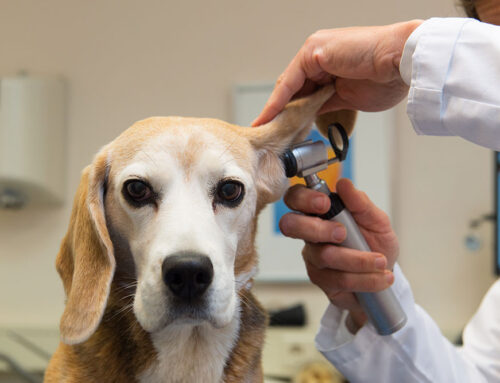Your dog’s breed is responsible for their behavior and demeanor, and the physical traits that endear them to you. However, a dog’s breed also predisposes them to certain health conditions based on genetic makeup. Understanding your dog’s unique health needs is crucial for ensuring their well-being and longevity. Our Palm City Animal Medical Center team explains common breed-related health conditions so you can take proactive steps to enhance and protect your four-legged friend’s health.
Small-breed dog conditions
Though pint-sized, toy- and small-breed dogs are not immune to medical issues. Like larger dogs, these diminutive canines can be affected by health problems relating to their size and breed. The following are some conditions inherent in small-breed dogs:
- Beagles — An outgoing, lovable breed, beagles are predisposed to epilepsy, hypothyroidism, and hip dysplasia, a condition affecting the hip joint.
- French bulldogs — America’s most popular dog breed, the French bulldog is a brachycephalic, or flat-faced, breed that often suffers from respiratory problems. Many French bulldogs are also prone to allergies, skin conditions, and cataracts.
- Cavalier King Charles spaniel — These spaniels are incredibly affectionate, but they are predisposed to mitral valve disease, a heart condition that causes the valve to weaken, resulting in a heart murmur.
- Dachshunds — Lovingly referred to as “weenie dogs,” common health conditions affecting them include epilepsy and intervertebral disc disease (IVDD), which causes pain and spinal damage.
- West Highland white terriers — Westies are prone to various skin conditions such as atopic dermatitis and allergies.
- Pembroke Welsh corgis — While everyone adores them for their fuzzy behinds, corgis can inherit von Willebrand’s disease, a blood clotting disorder, and degenerative myelopathy, a progressive spinal cord disease.
- Pugs — Pugs are a popular brachycephalic breed predisposed to pug dog encephalitis, an inflammatory brain disease unique to pugs, as well as brachycephalic syndrome.
Most small-breed dogs are predisposed to dental problems because they have small mouths that cause their teeth to be crowded. Another small-breed issue is patellar luxation, a knee condition that can lead to ligament ruptures and other injuries. Additionally, all brachycephalic breeds, including pugs, bulldogs, and Boston terriers, are susceptible to respiratory problems as a result of their facial conformation.
Health problems in medium- to large-breed dogs

Medium-size and large dogs have certain health conditions related to genetics and stature. The following is a sampling of medium- to large-breed dogs who have breed-related health conditions:
- Boxers — Boxers are known for their energetic nature, but they also have a genetic disposition to heart diseases, including boxer cardiomyopathy and aortic stenosis, a condition causing the aortic valve to narrow.
- Cocker spaniels — These medium-sized spaniels often inherit eye diseases, including cataracts and progressive retinal atrophy (PRA), a degenerative disease that leads to vision loss. Cockers are also susceptible to ear infections.
- Doberman pinschers — This athletic, intelligent breed is prone to hip dysplasia, an abnormal hip socket joint formation.
- German shepherd dogs — A popular dog breed, German shepherd dogs are intelligent, trainable dogs predisposed to musculoskeletal problems such as hip and elbow dysplasia and degenerative myelopathy.
- Rottweilers — The “rottie” is a confident, stocky breed often genetically prone to developing heart conditions such as subaortic stenosis and dilated cardiomyopathy.
- Labrador retrievers — Although susceptible to joint conditions, such as elbow or hip dysplasia, labs are typically healthy dogs. However, they are often likely to become obese, developing health issues related to this condition.
Many large-breed dogs often develop musculoskeletal problems because of their conformation, energy, and high-impact play. In addition, deep-chested dogs, such as Great Danes, Newfoundlands, and Saint Bernards, can develop gastric dilatation-volvulus (GDV), or bloat. This condition arises when the stomach becomes distended with air, cutting off blood flow to the heart.
Irrespective of your dog’s breed, regular veterinary care, good nutrition, dental hygiene, and exercise significantly contribute to their health and longevity. By working closely with our veterinarian, you can manage or curtail any genetic health problems your furry friend may face. Every pet is unique, and individualized care tailored to their specific needs is paramount to promoting their overall health and longevity.
Contact our Palm City Animal Medical Center team when you have questions or concerns about your pet’s health and well-being.








Leave A Comment